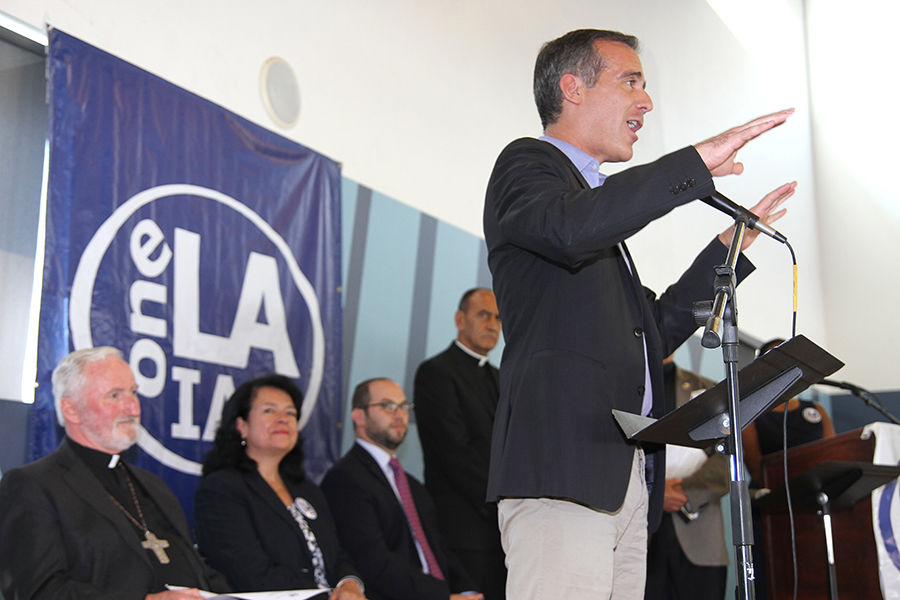This summer could mark the beginning of more affordable housing for the city of Los Angeles — where the housing shortage and skyrocketing rents have reduced many families, veterans and undocumented residents to homelessness or stranded in shelters.
On July 16, members of One LA-IAF (Industrial Areas Foundation), an interfaith organization for social reform, met with elected officials at St. Thomas the Apostle School to confirm their commitment to various key policies. More than 350 community members and civic, labor and faith leaders from the Los Angeles area attended the meeting, including Bishop David O’Connell, episcopal vicar for the San Gabriel Pastoral Region.
Los Angeles Mayor Eric Garcetti pledged his support for the linkage fee, a plan to make luxury real estate developers pay a fee for each new building in order to finance the Affordable Housing Trust Fund. Linkage fees would result in an estimated $75 million to $92 million each year for building new (or renovating existing) affordable housing units.
The mayor promised to pass the new legislation this summer. “We are going to make a pledge to you that we are going to support you in your efforts to get that legalization passed,” he said.
Garcetti added that Los Angeles is currently the homelessness capital of the U.S., a title that he said he wants removed as quickly as possible. Affordable housing is a necessary step. In 2014, nonprofit developers found that L.A. County was lacking 490,340 affordable housing units.
The systematic mistreatment of undocumented workers has played a large role in poverty and lack of education, according to several young people who took to the stage to share their immigration experiences.
Carolina Palomares told the assembly of her experience being an “alien,” a term she heard as a child but did not understand. Later she began to realize the connotations of the word. “I was too young to understand that I was considered of less value, less important than someone who was born here,” she said.
Sheriff Jim McDonnell of the Los Angeles County Sheriff’s Department also addressed the topic of immigration. He said that as a first-generation citizen, whose parents hailed from Ireland, he had “a sensitivity to what many of our immigrant families are dealing with.”
McDonnell said he would work to place a stay of deportation on the 200,000 undocumented workers in L.A. County, who are waiting to receive visas that they are eligible for due to their status as victims of crime, sex trafficking or forced labor.
But he stressed that the Sheriff’s Department was not responsible for deporting undocumented workers. “We are not here to enforce immigration laws. We are here to maintain a balance between public trust and public safety.” He said this trust was critical to ensuring safe communities.
McDonnell added, “We don’t stop anyone to find out their immigration status. We don’t ask that at any point during the process.”
The only dealings his department has with the U.S. Immigration and Customs Enforcement (ICE) is to allow them into the county jails to remove violent offenders slated for deportation, usually murderers or sex traffickers. This relationship, he noted, is necessary to prevent these offenders from re-victimizing the community.
McDonnell also said that ICE will go to the streets to find those offenders if they are not allowed into the jails. Doing so could result in the deportation of any undocumented persons they find with, or in the vicinity of, the offenders they seek.
“If they don’t have access to the jails, they are going to go into the community and they have told us very clearly that if there are undocumented people in the room or in the environment, then they go too,” he explained.
Deputy Chief Robert Acros of the L.A. Police Department also spoke. He wanted to reassure parents of undocumented children that they are safe to attend school. “We are a sanctuary school district,” he said, “which means that fear stops at our door.”
Sheriff McDonnell thanked One LA-IAF for their work. The organization has already scheduled more meetings and seminars to work with government officials on social issues that affect Los Angeles. Many people see problems and think, “Someone should do something about that,” he said.
“We are all somebody. You’ve taken that step forward to make our community better and safer.”

